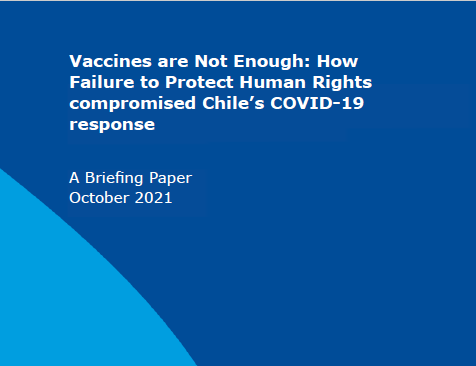The Chilean government’s misuse of emergency powers in response to the COVID-19 crisis highlights the need to use the country’s ongoing constitutional drafting process to incorporate protections for economic, social and cultural rights and limit emergency powers, said the International Commission of Jurists (ICJ) in a report published today.
The report, entitled “Vaccines are Not Enough: How Failure to Protect Human Rights compromised Chile’s COVID-19 response” documents the effect of the COVID-19 pandemic on existing poverty and inequality and human rights infringements resulting from the Chilean government’s COVID-19 emergency responses. Despite a successful vaccination campaign, by which according to official government data 89.05% of population has been fully vaccinated, concerns remain about Chile’s sometimes heavy-handed response to the pandemic.
“The implementation of a state of exception in Chile inappropriately gave extremely overbroad powers to military officials who implemented sanitary measures for more than a year and a half. This was all done consistently with archaic constitutional provisions that do not set out satisfactory limits and restrictions on executive power during states of exception.” said Rocío Quintero, ICJ Legal Adviser.
The ICJ emphasized that in a significant part of the Chilean territory, the government imposed severe restrictions to the right to freedom of movement and criminal sanctions were used against people who violated the restrictions.
“With the drafting of a new Constitution, Chile has an opportunity to commit to a comprehensive set of fully justiciable economic, social and cultural rights which would require much more exacting and long term social and economic measures by the government to eliminate poverty and eradicate inequality”, said Quintero.
The ICJ said that a new Constitution also presented an opportunity for Chile to be a pathbreaker in revising its constitution to fully embody and embrace human rights-based restrictions on emergency measures ensuring that they are necessary, proportionate and evidence-based. Emergency measures should promote the rule of law by ensuring effective judicial and legislative controls on executive action even the context of public health emergencies such as those brought on by pandemics. The military simply should not have a central role in responding to public health emergencies.
The report provides recommendations to the Chilean authorities to design and implement COVID-19 response measures. For instance, it is stressed that sanitary measures, such as quarantines and curfews, should fully respect the rights to freedom of movement and peaceful assembly and that all measures restricting or limiting rights are non-discriminatory, necessary and proportionate to the particularities of the pandemic threat. In health emergencies, the implementation and enforcement of public health measures should be the responsibility of competent civilian authorities and public health experts, not military personnel.
It also provides recommendations to the Constitutional Convention, including the incorporation of a full range of economic, social and cultural rights in a new Constitution, and improved regulation of states of exception to ensure the consistency of Chilean law with international human rights law.
Background
The “state of exception of catastrophe for public calamity” (Estado de Excepción Constitucional de Catástrofe, por Calamidad Pública), which allowed the declaration of quarantines and curfews, was declared by the government on 18 March 2020 and continued until as recently as 30 September 2021, despite transmission of COVID-19 diminishing significantly from July 2021. Though Chile’s government has enacted various social relief measures to compensate for the social and economic harm caused by the pandemic and government responses to the pandemic, their temporary nature of these measures and the degree of intervention are of concern.
Chile is now in the process of revising its Constitution, after a national referendum in 2020 approved replacing the 1980 Constitution, enacted during the Pinochet military dictatorship. This process was triggered by the 2019 social uprising during which thousands of Chileans went out to the streets in protest to demand fundamental changes to the social and economic model adopted by Chile. On 15 November 2019, the Chilean Congress approved the President’s proposal to develop a new constitution. In May 2021, the 155 members of the Constitutional Convention (Convención Constituyente) were elected. It is expected that a new Constitution will be approved by mid-2022.
Read the report here.
Executive summary in English here and Spanish here.
For more information:
Rocío Quintero M., ICJ Legal Adviser, Latin America, e: rocio.quintero@icj.org
Tim Fish Hodgson, ICJ Legal Adviser on Economic, Social and Cultural Rights, e: timothy.hodgson@icj.org

